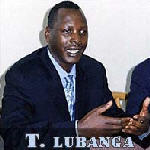Butty interview with Mendez - Download (MP3)
![]()
Butty interview with Mendez
- Listen (MP3)
![]()
The International Criminal Court (ICC) will hear arguments Tuesday about
the evidence against Thomas Lubanga, the former leader of the Union of
Congolese Patriots (UPC) militia from eastern Congo. He has been held in The
Hague, Netherlands, since March 2006 on charges of committing war crimes by
recruiting children as militia members.
The trial was postponed earlier this month because the United Nations would not transmit to the parties evidence presented by the prosecution. The ICC judges said the trial of Lubanga could not be fair if part of the evidence in the possession of the prosecutor is not revealed to the defense or the judges.
Juan Mendez is president of the International Center for Transitional Justice (ICTJ). He told Tuesday's hearing is important because it speaks to the legitimacy of the ICC and due process.
"The hearing on Tuesday is an interrogatory hearing on the question of the use of evidence of a confidential nature. This is of course a very important matter because it deals with the legitimacy and credibility of the International Criminal Court to offer due process. To that extent, it's good that the International Criminal Court is taking pains to ensure that Mr. Lubanga gets a fair trial," he said.
But Mendez said while any war criminal should not be allowed to go free, Lubanga or any other war criminal have a right to due process.
"We don't know whether this evidence would be admissible in court or not. But of course if it is admissible, his defense has to have the chance to review it and contest it. That is the essence of a fair trial," Mendez said.
He urged the ICC, the prosecutor's office, the defense and the United Nations to use the evidence in a way that is consistent with a fair trial.
"The prosecutor has to have prima facie evidence to bring it before the court, and he definitely has. That doesn't mean that once the prosecutor makes a decision, Mr. Lubanga has to be considered guilty. In fact the evidence presented by the prosecutor has to be reviewed by the court. Right now the court is not saying that he is innocent. It's just reviewing procedural way in which the evidence can be presented," he said.
Mendez agreed in part that the way in which the ICC handles the Lubanga trial could affect future war crimes cases at the court.
"First I'm not assuming that he (Lubanga) will be let go. As I said, the court has found serious problems with the way the evidence has been gathered and presented. But it may still be possible to reject some evidence and use some other kind of evidence. As you know, the evidence comes from the United Nations and from its sources in the Democratic Republic of Congo. We don't know why the information is confidential. But if the confidentiality can be lifted, then the trial can proceed. But you're absolutely right that the court may decide in the future that the case is fatally flawed and cannot proceed, and in that case Mr. Lubanga will definitely be released," Mendez said.
Mendez, who described his organization as a supporter of a serious International Criminal Court, said if Lubanga cannot be tried because of flawed evidence, it would legitimize the ICC and not discredit it.







